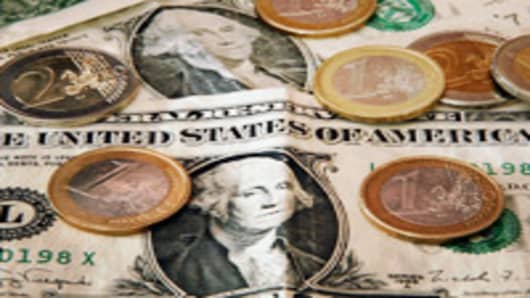The dollar rose to a 3-1/2-month high against the yen on Tuesday after Federal Reserve Chairman Ben Bernanke raised his anti-inflationary language, stoking expectations for U.S. interest rate hikes.
Bernanke late on Monday said the U.S. central bank would strongly resist rising inflation expectations and said the latest surge in energy prices added to dangers from price pressures.
He also said the risk of a substantial downturn in the U.S. economy had receded, sparking broad dollar gains and sending U.S. bond yields soaring.
Bernanke's remarks represent "a notable sharpening of the inflation rhetoric compared with his remarks last week," said Steve Malyon, senior currency strategist at Scotia Capital in Toronto, in a research note to clients. "The implied odds that the Fed tightens rates as early as August now outweigh the odds they leave rates unchanged."
Federal funds futures suggested that traders are fully pricing in the prospects of the Fed lifting its fed funds target rate by half a percentage point by October and by three-quarters point by year-end.
Midway through the New York session, the dollar was up about 1 percent against the yen , close to the session high of about 107 yen and the highest in 3-1/2 months. The dollar has had its biggest two-day rally against the yen since April 1, at current prices.
The euro was down more than 1 percent, while the dollar also gained 1.1 percent against a basket of currencies. It was the biggest one-day jump in the dollar index since Dec. 14 at current prices.
The euro has lost 1.9 percent against the dollar in the last two sessions, the biggest two-day decline since Dec. 14 at current prices.
Separately, U.S. President George W. Bush reaffirmed on Tuesday his administration's strong-dollar policy and said the market would establish the value of the U.S. currency.
Inflation Busters
The dollar initially began to rally on Monday morning after U.S. Treasury Secretary Henry Paulson declined to rule out currency market intervention to stabilize the dollar, comments he let stand in a television interview on Tuesday.
New York Fed President Timothy Geithner said on Monday the Fed was paying close attention to the dollar.
Bernanke shocked markets last week by saying a weaker dollar was adding to inflation risks—a rare departure from normal policy of Fed officials not commenting on the dollar—which began to raise speculation about intervention.
Though Bernanke was effectively eclipsed last week by European Central Bank President Jean-Claude Trichet, who signaled a near-term ECB rate hike to combat soaring euro area inflation, Bernanke's comments on Monday pushed him back to the fore.
Bernanke's most recent comments indicated that top policy-makers are trying to limit the inflationary impact from oil rising to nearly $140 a barrel ahead of this weekend's meeting of the Group of Eight nations in Japan.
Other Fed speakers on Tuesday repeated the theme that inflation is the main concern: Boston Fed President Eric Rosengren said rising food and energy costs are still trickling through the economy, complicating the outlook for inflation.
Dallas Federal Reserve President Richard Fisher said the Fed will not allow inflation to get out of control and is aware that a weaker dollar could feed into higher prices.
The Bank of Canada held its key interest rate steady at 3 percent on Tuesday in a surprise move and signaled an end to its rate-cutting cycle because of unexpectedly strong inflationary pressures.
The dollar was last up 0.1 percent against the Canadian dollar at C$1.0239.
Treasury Secretary Paulson also said on Tuesday it was "critical" for China to adopt a more flexible currency regime if it expects to protect its thriving economy from runaway inflation.


